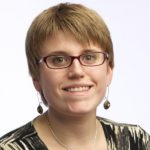Clark College hopes subtracting remedial math courses and adding real-world context will equal student success.
The school recently received a two-year, $150,000 grant from College Spark Washington, which funds programs across the state to support low-income students. Students in remedial math classes currently have to take up to four classes to catch up. The new program will replace that with a two-course program, featuring changes to curriculum that make math more hands-on and applicable to their planned major.
“We have a pretty convoluted precollege math pathway here at Clark,” said Joan Zoellner, a math professor at Clark College. “It’s pretty confusing for students.”
And confusing isn’t the only problem. Those math classes can be a barrier to students completing their degrees. This quarter, 1,007 of the school’s 2,553 students enrolled in math classes are taking remedial courses. That’s low, because it’s the last quarter of the school year, Zoellner said. Typically, about 75 of the college’s students place into remedial math, she said.
On average, only about 24 percent of students who place in remedial math courses place into college-level math within one year. And only 14 percent who place into precollege math end up placing in a college-level math course within two years, “which is appalling,” Zoellner said.
“It’s unfortunately a trend throughout the country,” she said. “The more classes there are, the more opportunities there are for students to not succeed.”
It’s a phenomenon Martha Ellis, director of higher education services for the Charles A. Dana Center at the University of Texas in Austin, is all too aware of. The Charles A. Dana Center works with schools from kindergarten to universities to improve math and science education. The center promotes reformed mathematics education so students can succeed in math and other courses.
Multiple levels of remedial math can be prohibitive for students, she said.
“They get lost along the journey because they’re so far removed from what they really want to study that they give up,” Ellis said.
The grant will also provide support for the school to shift its curriculum to a more hands-on curriculum with real world applications. Students who enter college taking remedial math courses usually do not pursue math-heavy degrees. That means for those students who ask that age-old question, “When am I ever going to use this?” the answer is usually never.
That means the school will reduce its focus on subjects such as algebra and finding ways to use math to solve real-world problems.
“If we start with an interesting question and give it some meaning, it gives it some interest,” Zoellner said.
Clark College will pilot the program’s classes next school year, with plans to fully roll out the curriculum in the 2019-2020 school year.



